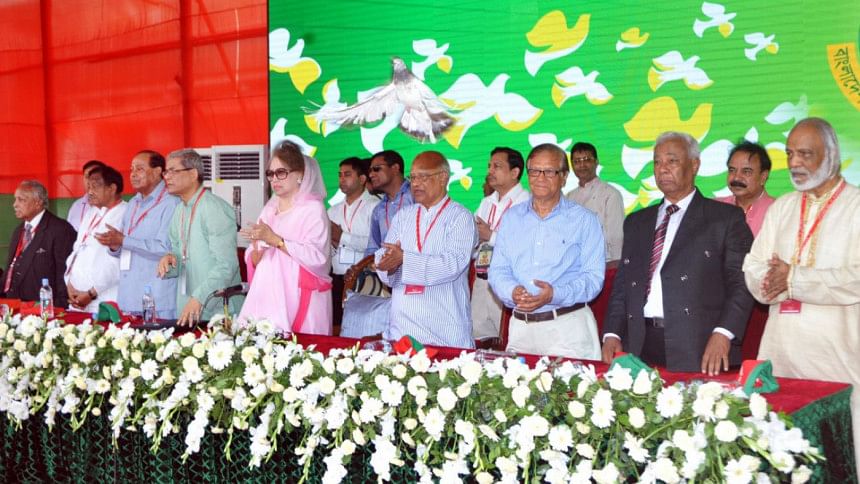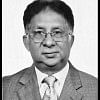More on restructure, thin on politics

That the Bangladesh Nationalist Party (BNP) could finally get its much delayed 6th National Council on the road on March 19, overcoming adversity from outside and from within its own ranks, and truncated in space, is in itself an achievement of some significance. The enthusiasm among the participants had as much to do with curiosity as it had to do with rediscovery. Only time will tell how far the event went to whet their appetite. It was nevertheless a far cry from the last National Council in 2009, when exuberance among the ranks and interest among the general public was visibly overwhelming.
Personnel changes effected in the Party following the council at the centre and at divisional levels will become public soon enough, now that the chairperson has been empowered to make these changes, as is the prevailing culture with all political parties in Bangladesh. What is known for the moment though is that the number of divisional organisation secretaries and their assistants have been rationalised, although there will be twice as many vice-chairmen in the centre than in the immediate past. It can also be safely presumed that Mirza Fakhrul Islam Alamgir will not need to 'act' as the Secretary General of the party for much longer and will be entrusted with the job full-time, at least for now. He has the unique distinction of suffering harassment from the government and humiliation from his own party in equal measure.
The 'Vision 2030' that was presented at the Council does contain elements that merit public discourse and debate. A part of it, the one on having a bi-cameral Parliament, means a fundamental structural change in the state's legislative body, and warrants serious considerations if one wants to have a truly representative legislature. It must be recalled that at the time of birth of Bangladesh as a state in 1971, 300 directly elected MPs represented a population of seventy five million. The country's population has since doubled, while the number of MPs has remained unchanged. This is most impractical and unworkable.
Most of the other ideas are pious pronouncements but well meaning.
While the 2030 vision may have been thrown up at the Council this time, it has been a work in progress over the last three years or more, unbeknownst to the party's authorised policy framers. Its architects first presented it to the chairperson in a PowerPoint presentation sometime in 2012 or 2013 in her Gulshan office late one evening, as has become the prevailing practice.
Major political parties universally institute structural changes over time. They are also expected to address the primary issues of politics, ideas and policies in order to adapt to shifting times. As things look now, the BNP's 6th Council has also tried to address structural matters, although more in terms of numbers, but the decision making process is unlikely to see any meaningful shift to a more open and inclusive format.
Mr. Abu Hena, a former BNP MP, has recently come up with some very constructive suggestions in the media on what the Council should do, both in form and substance, if the party is serious about looking into its mid and long term prospects for reinvigorating itself. Many in the party higher ranks privately complimented Mr. Hena for his thoughts, calling them very positive, timely and sound. It is doubtful though that these would have found any readership among those who really matter in the party.
It is in the area of politics that the Council has come up seriously short and has failed to grasp changing realities and loyalty of some people in its own ranks. Its future political steps remained shrouded in near total ambiguity.
It is no secret that the ruling party and large sections of the media and the intelligentsia have been very successful in painting the BNP as a sympathiser of religious fundamentalism in the body politic of Bangladesh. The thinking in the international community, especially among those who matter, is also not much different. Such perceptions can only be reinforced considering that the BNP's close alliance with, and dependence on, political forces that institutionally espouse fundamentalist politics and those that opposed the emergence of Bangladesh in 1971, does not show any visible sign of weakening. The 6th Council did not even seriously address this very critical issue. It is indeed a matter of supreme irony that a political party founded by a man who played a steering role in the glorious War of Liberation from the very start should now be seen to be carrying this stigma. If the Council was expected to be a defining moment for the party's future politics, it should have clearly expressed its opposition to politics of fundamentalism and extremism in Bangladesh.
According to media reports, the chairperson blamed the government's heavy-handed response for the failure of its agitation programme in 2015. In the same breath, she openly accused many top leadership of betrayal at this very critical juncture. That the Party recognised the use of violence as a failed policy was evident when the Council talked of 'constructive and peaceful' political programmes in the future.
True, under the present circumstances and in its weakened state, the BNP can do very little to resist the current government's continued use of the state machinery against political adversaries. It is in the area of addressing the issue of 'betrayers' that the party can do much if it wants to. Betrayal is not a new phenomenon for the BNP. It first surfaced under military dictator Ershad. However, it was during the infamous '1/11' episode that it became most blatant. During those dark days, many of its leaders took up key posts in the party as imposters in a clear expression of no confidence on the Party's leadership. Their mission having disastrously failed, the same people are now publicly bending over backwards in praise of the very same leadership in the hope of landing a plum post in the party's policymaking body. One needs to wait and see how the party leadership plans to deal with people whose commitment and reliability are at best questionable. Then there remains the question of those whom the chairperson believes betrayed the party in the challenging days of 2015.
On the eve of the 6th BNP National Council, Dr. Zafarullah Chowdhury of Gonoshastho Kendro fame, a known BNP sympathiser, had lucidly voiced serious scepticism on its outcome. He had predicted that the personnel changes will have a very, very narrow focus and there will not be much more in terms of substance.
Dr. Chowdhury was obviously looking into a crystal ball.
The writer is decorated freedom fighter and a former Vice Chairman of BNP.

 For all latest news, follow The Daily Star's Google News channel.
For all latest news, follow The Daily Star's Google News channel. 



Comments